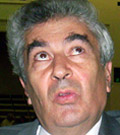Armenian citizens will feel the consequences of the exclusion of the ban on dual citizenship after the government adopts the law on that. It’s obvious that the government is not going to be able to make a final decision as to whether or not dual citizens will get the right to vote and be elected.
The ARF parliamentary faction is currently working on passing the “law on dual citizenship” and is holding parliamentary hearings. The faction is trying to find the answer to one question: will dual citizens have the right to vote and get elected? If yes, what will the regulations be and how can dual citizens get that right?
During the constitutional amendments referendum, head of the National Assembly Republican faction Galust Sahakyan said that the coalition members had agreed that dual citizenship was supposed to be symbolic. In other words, they weren’t going to give dual citizens the right to vote and get elected. “168 Hours” asked Sahakyan if he would be in favor of granting dual citizens the right to vote and get elected if the ARF pulls off the adoption of the law?
“I don’t think the government will grant dual citizens the right to vote and get elected. If they try to include that in the law, then I will personally go against that because that can lead to negative consequences and threaten national security,” said Galust Sahakyan. I must say that Sahakyan has a right to worry.
It’s simply anti-constitutional to set bans on voting and getting elected when it’s not even stated in the constitution. That’s why the opposition demanded including a clause in the constitutional amendments draft, according to which dual citizens should not have that right. Whereas there are some constitutional bans for getting appointed to some position, according to the Armenian constitution, each citizen of Armenia 18 and over has the right to vote, The dual citizen is also considered a citizen of Armenia and if he’s not allowed to vote, then that is looked at as a violation of human rights. But the dual citizens living abroad shouldn’t have the right to determine the future of Armenia. The UN Chief Assembly (as well as other similar international organizations) considered this and called on the Armenian government not to adopt a law on dual citizenship.
 “If dual citizens become citizens of Armenia, they get the right to vote and get elected whether or not they decide to keep the other citizenship. That’s based on international rights. The right to vote and get elected has to do with how long they have lived in the country. It’s not hard to solve this problem, but the principle is the period,” said president of the Constitutional Court of Armenia Gagik Harutyunyan.
“If dual citizens become citizens of Armenia, they get the right to vote and get elected whether or not they decide to keep the other citizenship. That’s based on international rights. The right to vote and get elected has to do with how long they have lived in the country. It’s not hard to solve this problem, but the principle is the period,” said president of the Constitutional Court of Armenia Gagik Harutyunyan.
According to Harutyunyan, the 54 countries that have passed dual citizenship have found the right solution to the problem and he calls on the Armenian government to find its solution too. This is what head of the National Assembly constant committee on foreign affairs and the ARF Supreme Body member Armen Rustamyan had to say:
“If the dual citizen takes on the responsibilities and fulfills them, then he should get the right. It would be unfair not to grant him the right to vote and get elected if he has lived in Armenia for the required amount of years and fulfilled his responsibilities just like Armenian citizens.”
But Armen Rustamyan claims that not all dual citizens will want to take on all the responsibilities.
Former head of the National Assembly constant committee on foreign affairs and member of the Armenian National Movement administration Hovhannes Igityan says that “there will be two types of Armenian citizens” after passing the “law on dual citizenship”.
 “The Armenian constitution states the rights and responsibilities of Armenian citizens. It also states: “Dual citizens’ rights and responsibilities are based on the law”. So, we have two types of citizens. The rights and responsibilities of the first group of citizens are based on the Constitution, while the other half stands up for its rights and fulfills the responsibilities based on a separate law. Supposedly, the rights and responsibilities of Armenian citizens stated in the Constitution don’t refer to dual citizens,” says Hovhannes Igityan.
“The Armenian constitution states the rights and responsibilities of Armenian citizens. It also states: “Dual citizens’ rights and responsibilities are based on the law”. So, we have two types of citizens. The rights and responsibilities of the first group of citizens are based on the Constitution, while the other half stands up for its rights and fulfills the responsibilities based on a separate law. Supposedly, the rights and responsibilities of Armenian citizens stated in the Constitution don’t refer to dual citizens,” says Hovhannes Igityan.
As for dual citizens’ right to vote and get elected, he says:
“I don’t think it really matters whether citizens vote abroad or in the country as long as Armenian citizens can’t voice their opinions during elections. It doesn’t matter whether there will be more than a million Armenians from the Diaspora taking part in the elections, or less than a million. The authorities will distribute the votes however they see fit.”
It is worth mentioning that the two pro-government parties-the Armenian Republican Party and the ARF-contradict each other regarding the “law on dual citizenship”. It’s quite possible that things will start heating up during the upcoming parliamentary hearings on the law and they will serve as a firm basis for the split of the coalition.
“If we don’t see any antagonist contradictions, then everything will be fine. This is not an antagonist issue. This is a misunderstanding. I don’t think that the coalition is of the opinion that dual citizens shouldn’t get the right. It would simply be illogical not to grant them the right to vote and get elected if they fulfill all their responsibilities,” said ARF member Armen Rustamyan.
Galust Sahakyan said:
“The constitution that allows passing such a law has to do with a political compromise.”
